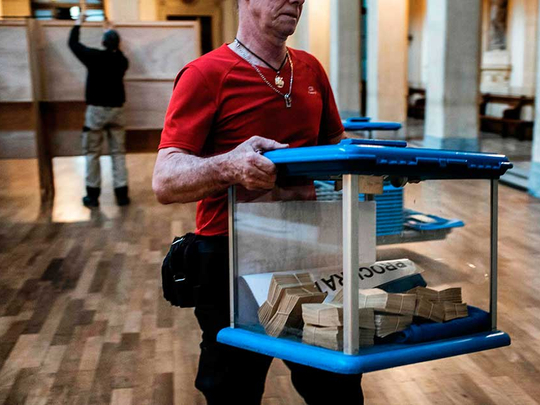
MADRID: Michel Beausang pushed aside what remained of his grilled octopus, swirled his fork and smacked his lips. “Melenchon. He is the only one who speaks the truth for the ordinary man. And he understands the soul de la republique,” Beausang says, slipping back into French as he speaks to Gulf News.
While currently vacationing in Spain, the 34-year-old Lyonnais bus driver was due to be back home in the central French city to cast his vote for the left-wing’s rising star in the first round of the nation’s presidential elections on Sunday.
“The others don’t speak the truth,” Beausang observes, adding that apart from National Front leader Marine Le Pen, they are no different than “blancmange” — an insipid French dessert. “Le Pen est fasciste, comme son père” he says, before repeating it carefully in deliberate English: “Le Pen is a fascist, like her father.”
Jean-Luc Melenchon, Le Pen and three other leading candidates — centrist Emmanuel Macron, socialist Benoit Hamon and conservative Francois Fillon — have the only realistic chances of making it to the top two positions to fight the second and final round of balloting two weeks from now, on May 7.
There are 11 candidates in today’s contest, and unless one receives more than 50 per cent of the votes cast, the second runoff contest is a sure thing. As it stands heading into today’s voting, a series of opinion polls had Le Pen and Macro evenly matched at around 24 per cent support each. Melenchon, who was at 11 per cent two months ago, has continued his recent surge with some polls putting him either marginally close to the leading two.
Those same polls showed Hamon and Fillon, who has been dogged by a series of scandals during the campaign over his wife’s employment and undeclared loans, slipping to levels of support in the mid-teens. When it comes to second-round voting intentions, every credible opinion poll has Le Pen losing to either Macron or Melenchon in two weeks’ time.
The two-round system, also used in French parliamentary, local and regional polls, was introduced in 1962 by Charles de Gaulle and has proved effective at keeping extremists out of power: You vote first with your heart, the French say, then with your head.
“It’s true,” Bernice Huberdeau tells Gulf News. She is accompanying Beausang on the Spanish break, and will also be voting for Melenchon.
Huberdeau explains that in the first round, French voters can play with the idea of voting Communist or Socialist on the left, or Conservative or National Front on the right. The second round of voting then makes people decide and accept “une compromise logique” — a logical compromise.
For the 33-year-old nurse, Melenchon’s promise to get rid of nuclear power and to introduce a constitutional clause to ensure France uses only as much renewable energy as it produces is a liberal step forward.
Both say they are fed up living in a country that feels under siege. Heavily armed security teams patrol the main thoroughfares of French cities as a precaution against terrorist attacks.
Refugees need to feel welcomed into all European society, Huberdeau says, adding that most of the terrorist attacks that have occurred in France have been committed by second-generation or long-settled immigrants from former French colonies in North Africa.
“It’s a result of political colonisation, not religious extremism,” she says as her partner nods.
If Le Pen has her way, every employer who has a non-French worker — even from another of the 28-member European Union — will be hit with a 10 per cent payroll tax. The National Front leader would also limit immigration to 10,000 per year, deport non-French criminals, build 45,000 more prison cells and ban any Islamic dress.
Le Pen would also hold a British-style referendum on France’s membership in the EU within six months of becoming president, and she would withdraw France from the 17-member club that uses the euro as the common European currency.
“We would be paying for our lunch here in Spain with new francs,” Beausang scoffs, adding she wants to turn the clock back to the time when France was a colonial power and trampled on the rights and freedoms of individuals in North Africa.
Huberdeau says that politicians on the right across the full European Union have forgotten that before the founding six nations of the EU came together, the continent was ripped apart by wars or revolution every 30 or 40 years since the time of Napoleon Bonaparte more than 200 years ago.











